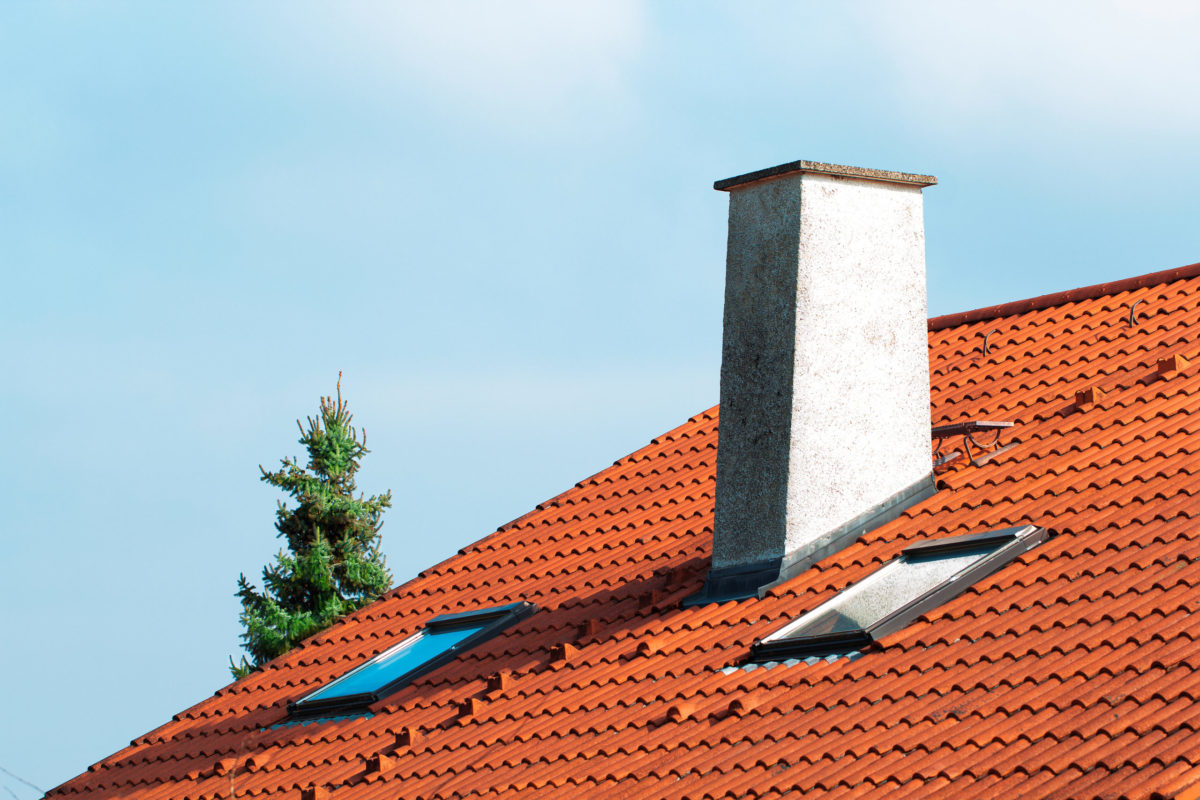How do you know if you need chimney crown repair? Read on to find out.
Nothing quite compares to the warm and cozy feeling of sitting by a crackling fire. But, like all good things, the beloved fireplace and chimney require regular maintenance, particularly the often-overlooked chimney crown.
The chimney crown, that concrete or cement cover at the top of a chimney, has an essential job — shielding the chimney and its interior components from weather damage. But what happens when this protective barrier starts to fail? 🤔
Here are the telltale signs that a chimney crown may need some TLC or, in some cases, a complete replacement.
Sign 1: Visible Cracks 🕸️
Cracks are the easiest and most common indication of chimney crown damage. Even the tiniest fissures can let in water, leading to more significant issues down the line, such as spalling (more on that later). If you see cracks, it’s time to call a professional.
It’s vital to conduct a thorough check for cracks in these areas:
1️⃣ Chimney Crown: The top of the chimney is the most exposed area and often the first to show signs of wear and tear.
2️⃣ Chimney Flue: Inspect the liner of the chimney. Cracks here can lead to dangerous situations, including fires and carbon monoxide leaks.
3️⃣ Chimney Bricks and Mortar: The bricks and mortar that make up the chimney can also develop cracks, especially in the joints.
4️⃣ Chimney Flashing: This thin piece of metal that connects the chimney to the roof can also crack, leading to leaks.
5️⃣ Chimney Shoulder: The wider base of the chimney, often made of brick or stone, is another spot to check for damage.
Remember, a crack may appear insignificant at first, but can quickly become a gateway for more substantial damage if left alone.
Sign 2: Water Leaks 💦
If you spot water or moisture in the fireplace or around the chimney, it’s a pretty sure bet that something’s wrong up top and you should start thinking to have your chimney crown repair. This moisture could indicate a failing chimney crown, allowing water to seep into the home, causing structural damage and even mold growth.
A leaky chimney crown could lead to a cascade of complications. Apart from the obvious water damage, which can cause substantial structural issues over time, there’s also the risk of mold growth. Mold, apart from being unsightly and potentially causing unpleasant odors, can pose a significant health risk to the residents of the home. Exposure to mold spores can trigger allergies and cause respiratory problems, among other health issues.
Moreover, water leaks can exacerbate the wear and tear on other parts of the chimney, accelerating the deterioration of bricks, mortar, and metal components.
Therefore, spotting water or moisture isn’t just a sign that you might need a chimney crown repair or replacement—it’s a warning that more significant problems could be on the horizon if the issue isn’t addressed promptly.
Sign 3: Spalling 🧱
Spalling is a fancy term for what happens when water penetrates masonry and forces the surface to peel, pop out, or flake off. If you notice bits of masonry around the chimney or in the fireplace, it’s a sign the crown could be letting in water so you should start considering to have your chimney crown repair.
Sign 4: Deteriorating Mortar Joints
Mortar joints are another sign to consider chimney crown repair, it holds the chimney bricks together. When they begin to deteriorate—usually due to water exposure—the chimney becomes structurally unsound. This deterioration can be a symptom of a damaged chimney crown.
Sign 5: Chimney Liner Damage
Imagine the chimney liner as the chimney’s personal bodyguard. Its critical job is to guide smoke and harmful gases safely out of your home, ensuring that your fireside experience remains as pleasurable and safe as possible.
But when this unsung hero of the chimney system is damaged, you may start to see some changes. The quality of your fire might diminish — it may not burn as brightly or as efficiently as before. Even more concerning, you might start to notice smoke inside the home, turning your cozy evening by the fire into a cough-inducing, eye-watering event. 🏭
Why should you care about chimney liner damage? Because it could point to an even more significant issue — a failing chimney crown. When water penetrates through a damaged crown, it can reach the liner, leading to rust, cracks, or worse.
Remember, your chimney liner isn’t just a functional component; it’s a critical safety feature of your home. So, if you suspect any damage to it, it’s time to give your chimney the attention it deserves.
Sign 6: Rust on Firebox or Damper
Rust: it’s the silent enemy of any metal component, and your chimney is no exception. Like an unwelcome guest, rust often shows up when water has found a way into places it doesn’t belong – in this case, the firebox or damper.
The firebox and damper play crucial roles in the fireplace’s function and safety. The firebox houses the fire, while the damper controls airflow, helping guide smoke up and out of the chimney. If either of these components starts to rust, it’s like a red flag waving, signaling that water is invading the chimney. 🚩
But rust doesn’t just act as a sign of trouble — it can cause trouble, too. If the damper starts rusting, you might find it becomes stiff or difficult to operate. This can result in poor ventilation, leading to smoke-filled rooms or inefficient fires.
💡 Did You Know?
A common misconception many homeowners hold is that chimneys, particularly those built with masonry, are impervious to weather conditions and completely resistant to water penetration. This is not true! While masonry chimneys might seem strong and permanent, they are far from invincible. Even certain stones are susceptible to water damage.
Constructed from a medley of masonry and metal materials, such as brick, mortar, concrete block, stone, flue tile, steel, and cast iron, each of these materials is susceptible to damage when subjected to direct contact with water or enduring water penetration. So, despite their sturdy appearance, masonry chimneys are not immune to the ravages of water and weather.
There’s a lot of potential damage to the chimney—and your wallet—if the chimney crown isn’t doing its job!
Time for Action! 🚀
Spotted one or more of these signs? Fear not; The Irish Sweep is here to help. Whether it’s a simple chimney crown repair or a full-on chimney crown replacement, we’ve got you covered.
Chimney Crown Repair: Wrapping a Raincoat Around Your Chimney ☔
There’s something beautifully poetic about the rain, but when it comes to your chimney, poetry can quickly turn into a homeowner’s nightmare. This is where The Irish Sweep truly shines, by offering solutions that are as innovative as they are effective.
We utilize specialized products that work wonders in waterproofing most chimneys. These exceptional products are unlike anything else currently available on the market. They function by creating a barrier against the elements, yet still allow any trapped moisture within the masonry to evaporate. Unlike other waterproofing solutions, a “chimney raincoat” won’t alter the appearance of your chimney, or even leave a finish, ensuring the authentic look of your chimney remains untouched. 🏡
And the best part? This remarkable “chimney raincoat” is guaranteed for an impressive 10 years! So, instead of worrying about the next downpour, you can relax, secure in the knowledge that your chimney is protected from whatever the weather throws its way.
Prevent damage before it starts, and let The Irish Sweep wrap a raincoat around your chimney. With us, your chimney is safeguarded. ☘️
Don’t wait for small issues to become major headaches. Remember, preventative maintenance is the key to a safe and long-lasting chimney. Let us help you maintain the comforting warmth and charm of your fireplace for years to come. Contact us today for an inspection and enjoy peace of mind along with your next cozy fire. 🔥


